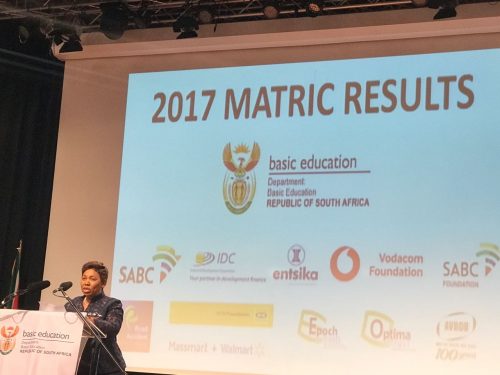Thabo Mohlala
The 2017 National Senior Certificates (NSC) results improved slightly by 0.3% to 76.5%, compared to the 2016 pass rate of 76.2%, excluding progressed learners.
The pass rate represents a total of 401 435 candidates, who had passed the 2017 NSC examinations.
The Free State province maintained its pole position by attaining 86%, a 2.2% decline from last year. Its fierce competitors, Gauteng and the Western Cape scored 85.1% and 82.7% respectively. The latter declined by 3.2% from its 2016 performance while Gauteng maintained its last year achievement.
But with the progressed learners included, the overall pass rate dips slightly and stands at 75.1%, a 2.6% improvement from the 72.5% achieved in 2016.
The department introduced progression policy in 2013 as a special dispensation to encourage provinces to pass or condone over-aged learners or those who repeated Grade 11 more than once to write NSC examinations. Alternatively, the learners were allowed to modularise their examinations.
Delivering keynote address during the release of the results at the SABC studios in Auckland Park, Minister of Basic Education, Angie Motshekga, praised the Class of 2017 for consistently maintaining the pass rate above the 70% threshold.
Motshekga said the Class of 2017 is “the tenth cohort of learners to sit for the National Senior Certificate, and the fourth cohort to write CAPS-aligned NSC Examinations”, adding this was the third highest enrolment of Grade 12 in the history of the basic education system in the country.
The overall number of candidates, who registered for the November 2017 NSC examinations, was 802 431 and this included 629 155 full-time candidates and 173 276 part-time candidates. Of these candidates, Motshekga said, 534 484 full-time candidates, and 117 223 part-time candidates, wrote the examinations.
“We wish to thank all provinces, especially Gauteng, Free State, Mpumalanga, and KwaZulu Natal for the extra support and pointed interventions they gave to their progressed learners. If these provinces did not do this, some of the progressed young people, could have fallen through the cracks of the system, due to continuous repetition and ultimate drop-out from the system”, said Motshekga.
She also stressed the important role of the district’s offices which are the key delivery vehicles nearest to schools. In 2017, 66 of the 70 districts attained pass rates of 60% and above, said Motshekga. She said 31 of the 70 districts attained pass rates of 80% and above.
She said 4 of the 70 districts achieved pass rates lower than 60%, adding that for the first time, no district has performed below 50%.
Motshekga also applauded three most rural provinces, namely Eastern Cape, KwaZulu-Natal and Limpopo, which recorded an upward trend in their performances. She said 51.5% of the candidates, who wrote the 2017 NSC examinations, come from the three provinces.
She said 68.7% of the candidates who wrote the 2017 NSC examinations passed and that the three provinces combined produced 44.8% Bachelor passes. This translates to almost 45 Bachelor passes per 100 produced anywhere else in the country, she said. Motshekga said the improved performance of the three provinces is a direct outcome of their targeted interventions.
She said the NSC results are very crucial because they serve as the barometer to assess progress government made in improving access, redress, equity, efficiency, and the quality of teaching and learning outcomes.
Motshekga said her department is prioritising early grade literacy in response to the recent international tests where South African learners fared badly in numeracy and literacy tests.
She said her department is making strides to accommodate learners with special education needs. “Providing learners with special education needs access to quality basic education programmes, is an imperative, based on the Constitutional principles of equity and redress, among others.
“We have for the past few years included the learners with special education needs in tracking learner performance in the NSC.”
Of the 2 777 learners with special education needs, wrote 2017 NSC examinations, 906 and 789 of these learners achieved Bachelor and Diploma passes, respectively. Those who achieved Higher Certificate passes are 307; 2 achieved NSC passes; and 121 achieved endorsed NSC passes.






